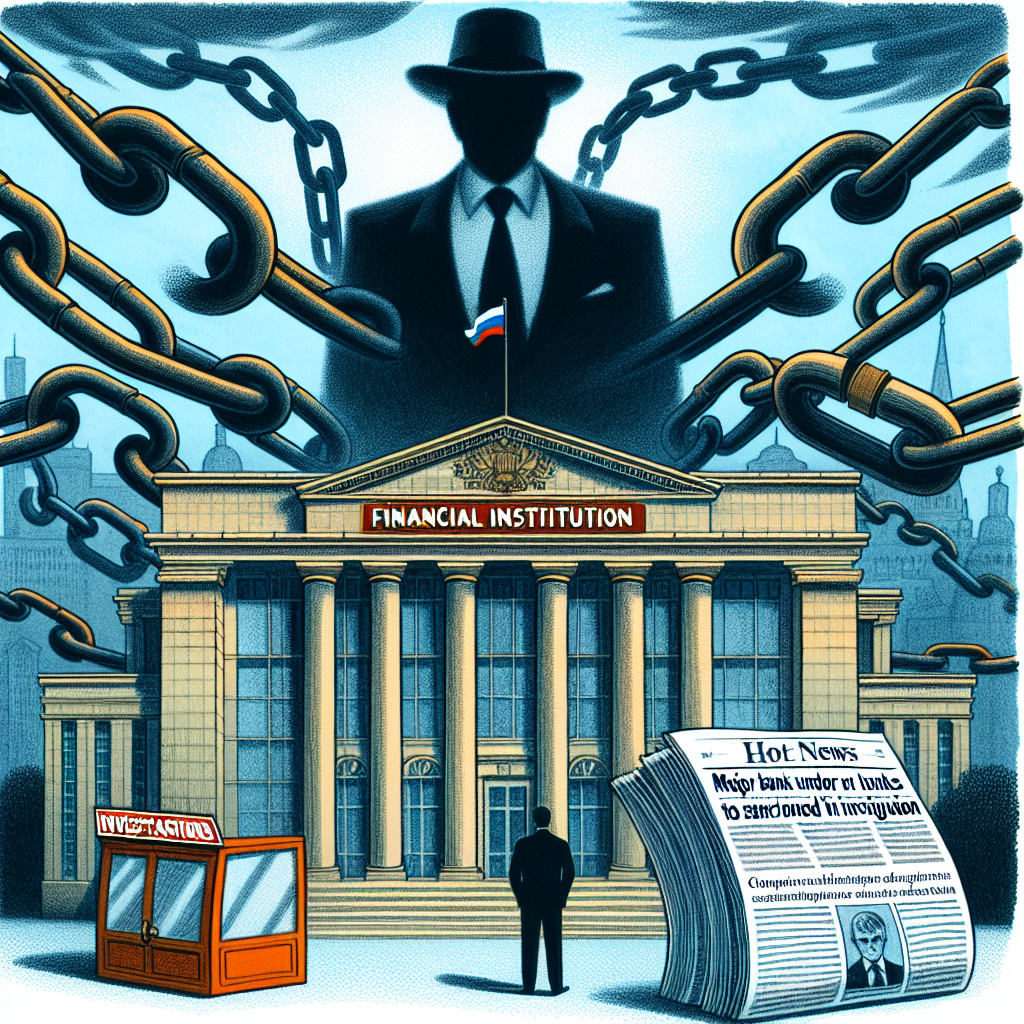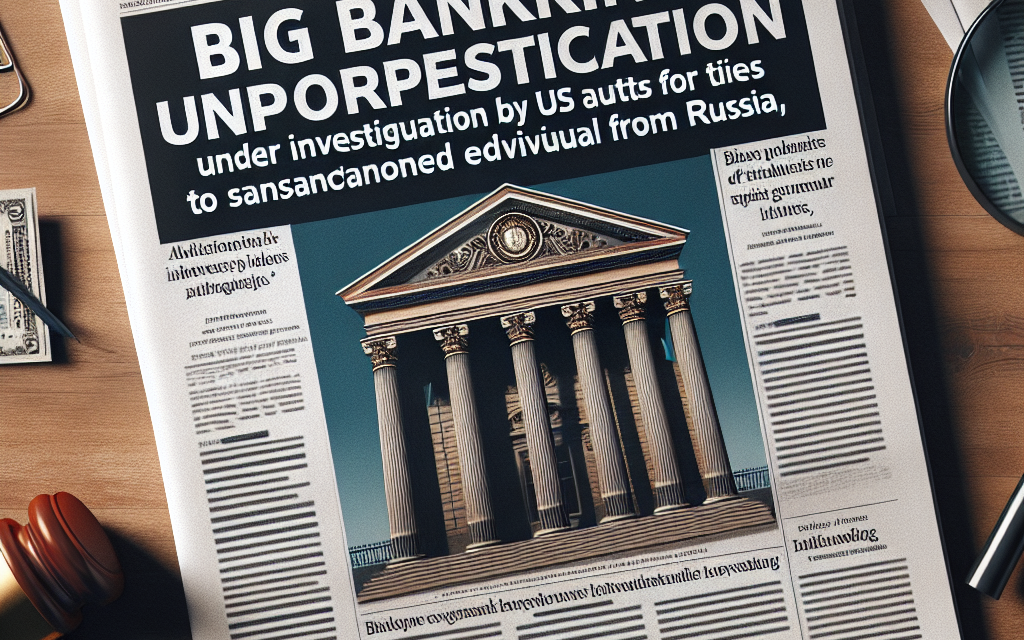“Citigroup Under Scrutiny: Navigating the Storm of Sanctions and Allegations.”
Introduction
Citigroup, one of the largest financial institutions in the United States, is reportedly under investigation by U.S. authorities for its potential connections to a sanctioned Russian billionaire. According to a report by Barron’s, the investigation seeks to determine whether Citigroup has violated any U.S. sanctions laws by maintaining financial ties with the individual in question. This development comes amid heightened scrutiny of financial institutions’ compliance with international sanctions, particularly those targeting Russian entities and individuals in response to geopolitical tensions. The outcome of this investigation could have significant implications for Citigroup, both in terms of regulatory repercussions and its reputation in the global financial market.
Overview Of Citigroup’s Alleged Links To Sanctioned Russian Billionaire
Citigroup, one of the largest financial institutions in the United States, has recently come under scrutiny as reports have emerged regarding its alleged connections to a sanctioned Russian billionaire. According to Barron’s, the U.S. government has initiated an investigation to determine the extent of Citigroup’s involvement with this individual, who is subject to sanctions due to geopolitical tensions and regulatory measures aimed at curbing the influence of certain Russian oligarchs. This development has raised significant concerns about compliance with international sanctions and the potential implications for Citigroup’s operations and reputation.
The investigation reportedly centers on whether Citigroup facilitated transactions or provided services that may have indirectly benefited the sanctioned billionaire. Such actions, if proven, could constitute a violation of U.S. sanctions laws, which are designed to isolate individuals and entities deemed to pose a threat to national security or foreign policy interests. The complexity of global financial networks often makes it challenging to trace the flow of funds and determine the ultimate beneficiaries of financial services, thereby complicating the enforcement of these regulations.
In light of these allegations, Citigroup has stated its commitment to full cooperation with the investigation. The bank has emphasized its adherence to stringent compliance protocols and its dedication to upholding the highest standards of regulatory compliance. Citigroup’s response underscores the importance of maintaining robust internal controls and monitoring systems to detect and prevent any potential breaches of sanctions laws. This situation also highlights the broader challenges faced by multinational financial institutions operating in a highly interconnected and regulated global environment.
The potential ramifications of this investigation are significant, not only for Citigroup but also for the broader financial industry. Should the investigation uncover any wrongdoing, Citigroup could face substantial fines and penalties, as well as reputational damage that could impact its relationships with clients and regulators. Moreover, this case serves as a reminder of the critical importance of due diligence and risk management in the financial sector, particularly when dealing with high-risk clients or regions subject to international sanctions.
Furthermore, this investigation may prompt other financial institutions to reevaluate their own compliance frameworks and risk assessment processes. The heightened scrutiny on Citigroup could lead to increased regulatory pressure on banks to enhance their efforts in identifying and mitigating potential exposure to sanctioned individuals and entities. This, in turn, could result in a more cautious approach to client onboarding and transaction monitoring, as banks seek to avoid similar controversies.
In conclusion, the investigation into Citigroup’s alleged links to a sanctioned Russian billionaire underscores the complexities and challenges of navigating the global financial landscape. As the situation unfolds, it will be crucial for Citigroup to demonstrate transparency and accountability in addressing the concerns raised by regulators. At the same time, this case serves as a poignant reminder for the financial industry of the importance of rigorous compliance measures and the need to remain vigilant in the face of evolving regulatory expectations. The outcome of this investigation will likely have far-reaching implications, not only for Citigroup but also for the broader efforts to enforce international sanctions and maintain the integrity of the global financial system.
Impact Of US Investigation On Citigroup’s Global Operations
The recent revelation that Citigroup is under investigation by U.S. authorities for potential links to a sanctioned Russian billionaire has sent ripples through the financial world, raising questions about the broader implications for the bank’s global operations. As one of the largest financial institutions in the world, Citigroup’s extensive network spans numerous countries and sectors, making the potential impact of this investigation particularly significant. The scrutiny comes at a time when global banks are under increasing pressure to comply with international sanctions, especially those targeting Russian entities and individuals in response to geopolitical tensions.
The investigation reportedly centers on Citigroup’s dealings with a Russian billionaire who has been sanctioned by the U.S. government. Such sanctions are designed to isolate individuals and entities deemed to be acting against U.S. interests, often in response to actions by the Russian government. For Citigroup, the implications of this investigation could be far-reaching, affecting not only its reputation but also its operational capabilities across various jurisdictions. The bank’s compliance with international regulations is crucial to maintaining its standing in the global financial community, and any perceived lapses could lead to significant consequences.
In the short term, the investigation may lead to increased scrutiny from regulators, not only in the United States but also in other countries where Citigroup operates. This could result in a more cautious approach to transactions involving sanctioned individuals and entities, potentially slowing down operations and increasing compliance costs. Moreover, the bank may need to reassess its risk management strategies to ensure that similar issues do not arise in the future. This could involve implementing more stringent internal controls and enhancing due diligence processes, which may require additional resources and investment.
Furthermore, the investigation could have a ripple effect on Citigroup’s relationships with clients and partners. Trust is a cornerstone of the banking industry, and any doubts about a bank’s compliance with international regulations can lead to a loss of confidence among clients. This could result in clients seeking alternative financial institutions that they perceive as having a stronger commitment to regulatory compliance. Additionally, partners and counterparties may become more cautious in their dealings with Citigroup, potentially affecting the bank’s ability to engage in certain transactions or enter new markets.
In the long term, the outcome of the investigation could influence Citigroup’s strategic decisions, particularly in regions where geopolitical tensions are high. The bank may choose to scale back its operations in certain areas or exit markets that are deemed too risky from a compliance standpoint. This could lead to a realignment of its global strategy, focusing on regions and sectors where the regulatory environment is more stable and predictable. Such strategic shifts could have implications for the bank’s growth prospects and competitive positioning in the global financial landscape.
Ultimately, the investigation into Citigroup’s links to a sanctioned Russian billionaire underscores the complex and often challenging nature of operating in a globalized financial system. As banks navigate an increasingly intricate web of regulations and geopolitical considerations, the ability to effectively manage compliance risks will be crucial to their success. For Citigroup, the outcome of this investigation will likely serve as a pivotal moment, shaping its approach to global operations and its commitment to upholding the highest standards of regulatory compliance.
Legal Implications For Citigroup In The Wake Of US Scrutiny
Citigroup, one of the largest financial institutions in the United States, finds itself under intense scrutiny as reports emerge of a federal investigation into its alleged connections with a sanctioned Russian billionaire. This development, first reported by Barron’s, has significant legal implications for the bank, potentially affecting its operations and reputation. The investigation is part of a broader effort by U.S. authorities to enforce sanctions against Russian oligarchs, particularly in the wake of geopolitical tensions and ongoing conflicts involving Russia. As the U.S. government intensifies its focus on financial institutions that may have facilitated transactions for sanctioned individuals, Citigroup’s alleged involvement raises questions about compliance and due diligence within the banking sector.
The legal implications for Citigroup are multifaceted. Firstly, the bank could face substantial fines if found to have violated U.S. sanctions laws. These laws are designed to restrict financial transactions with individuals and entities deemed to pose a threat to national security or foreign policy interests. In recent years, the U.S. Department of the Treasury’s Office of Foreign Assets Control (OFAC) has imposed hefty penalties on financial institutions that have failed to adhere to these regulations. Consequently, Citigroup’s potential exposure to such penalties underscores the importance of robust compliance mechanisms within the banking industry.
Moreover, the investigation could lead to increased regulatory scrutiny for Citigroup, not only from U.S. authorities but also from international regulators. This heightened scrutiny may result in more stringent oversight and reporting requirements, which could impact the bank’s operational efficiency and increase its compliance costs. Additionally, the reputational damage associated with such investigations can have long-lasting effects, potentially eroding customer trust and investor confidence. In an industry where reputation is paramount, Citigroup must navigate these challenges carefully to mitigate any adverse outcomes.
Furthermore, the investigation highlights the broader issue of compliance within the global banking sector. Financial institutions operate in a complex regulatory environment, where they must balance the need for profitability with the obligation to adhere to legal and ethical standards. The Citigroup case serves as a reminder of the critical importance of implementing effective compliance programs that can detect and prevent illicit activities. Banks must ensure that their systems are capable of identifying transactions involving sanctioned individuals and entities, thereby reducing the risk of legal violations.
In response to the investigation, Citigroup has reiterated its commitment to compliance and cooperation with regulatory authorities. The bank has emphasized its efforts to enhance its compliance framework, including investments in technology and personnel to strengthen its ability to detect and prevent illicit activities. These measures are crucial not only for addressing the current investigation but also for safeguarding the bank’s operations in the future.
In conclusion, the investigation into Citigroup’s alleged links to a sanctioned Russian billionaire carries significant legal implications for the bank. As U.S. authorities continue to enforce sanctions laws rigorously, financial institutions must prioritize compliance to avoid potential penalties and reputational damage. For Citigroup, navigating this challenging landscape requires a steadfast commitment to transparency and cooperation with regulators. By reinforcing its compliance framework, the bank can better position itself to address the current scrutiny and maintain its standing in the global financial industry.
Analysis Of Citigroup’s Compliance With International Sanctions

Citigroup, one of the largest financial institutions in the world, is currently under scrutiny by U.S. authorities for its alleged connections to a sanctioned Russian billionaire. This investigation, as reported by Barron’s, highlights the intricate challenges that global banks face in navigating the complex web of international sanctions. As the geopolitical landscape becomes increasingly fraught, financial institutions like Citigroup must ensure rigorous compliance with international regulations to avoid potential legal and reputational repercussions.
The investigation into Citigroup’s dealings underscores the importance of robust compliance frameworks within multinational banks. Sanctions are a critical tool used by governments to exert pressure on individuals, entities, and nations that are deemed to pose a threat to international peace and security. In this context, financial institutions serve as gatekeepers, tasked with the responsibility of preventing sanctioned individuals from accessing the global financial system. However, the sheer volume of transactions and the complexity of financial networks can make it challenging for banks to identify and block all illicit activities.
Citigroup’s situation is emblematic of the broader challenges faced by banks operating in a globalized economy. The bank’s alleged ties to the Russian billionaire, who is subject to U.S. sanctions, raise questions about the effectiveness of its compliance mechanisms. It is crucial for banks to implement comprehensive due diligence processes, which include screening clients and transactions against updated sanctions lists. Moreover, banks must invest in advanced technologies, such as artificial intelligence and machine learning, to enhance their ability to detect suspicious activities in real-time.
Furthermore, the investigation into Citigroup highlights the potential consequences of non-compliance with international sanctions. Beyond the immediate legal ramifications, which could include hefty fines and penalties, banks risk significant damage to their reputations. In an era where public trust is paramount, any association with sanctioned individuals can lead to a loss of confidence among clients and investors. Consequently, financial institutions must prioritize transparency and accountability in their operations to maintain their standing in the global market.
In addition to technological investments, fostering a culture of compliance within the organization is essential. This involves training employees at all levels to understand the importance of adhering to international regulations and the potential risks associated with non-compliance. By cultivating an environment where compliance is ingrained in the corporate ethos, banks can better safeguard themselves against inadvertent breaches of sanctions.
Moreover, collaboration with regulatory bodies and other financial institutions can enhance a bank’s ability to navigate the complexities of international sanctions. By sharing information and best practices, banks can collectively strengthen their defenses against illicit activities. This collaborative approach not only benefits individual institutions but also contributes to the overall integrity of the global financial system.
In conclusion, the investigation into Citigroup’s alleged links to a sanctioned Russian billionaire serves as a stark reminder of the critical role that compliance plays in the operations of global banks. As financial institutions continue to operate in an increasingly interconnected world, they must remain vigilant in their efforts to adhere to international sanctions. By investing in advanced technologies, fostering a culture of compliance, and collaborating with regulatory bodies, banks can better navigate the challenges posed by the ever-evolving geopolitical landscape. Ultimately, these efforts are essential to maintaining the trust and confidence of clients, investors, and the broader public.
Market Reactions To Citigroup’s Involvement With Sanctioned Entities
The recent revelation that Citigroup is under investigation by U.S. authorities for its alleged connections to a sanctioned Russian billionaire has sent ripples through the financial markets. This development, reported by Barron’s, has raised concerns among investors and market analysts about the potential implications for the banking giant. As the investigation unfolds, market participants are closely monitoring the situation, assessing the potential impact on Citigroup’s financial health and reputation.
In the wake of these reports, Citigroup’s stock experienced noticeable volatility. Investors, wary of the potential legal and financial repercussions, reacted swiftly, leading to fluctuations in the bank’s share price. This reaction underscores the sensitivity of financial markets to regulatory and legal challenges faced by major financial institutions. The uncertainty surrounding the investigation has prompted some investors to adopt a cautious stance, while others see potential opportunities in the market’s response.
Moreover, the investigation highlights the broader issue of compliance with international sanctions, a matter of significant importance for global financial institutions. Banks operating on an international scale are required to navigate a complex web of regulations and sanctions, which can vary significantly across jurisdictions. The Citigroup case serves as a reminder of the challenges banks face in ensuring compliance with these regulations, particularly when dealing with high-net-worth individuals and entities that may be subject to sanctions.
As the investigation progresses, market analysts are keenly observing how Citigroup addresses the allegations and cooperates with authorities. The bank’s response will be crucial in determining the extent of any potential fallout. A proactive and transparent approach could help mitigate some of the negative market sentiment, while a lack of clarity or perceived non-cooperation could exacerbate concerns among investors.
Furthermore, the situation has sparked discussions about the broader implications for the banking sector. Financial institutions are increasingly under scrutiny for their dealings with sanctioned entities, and this case may prompt regulators to intensify their oversight. Banks may need to reassess their compliance frameworks and enhance their due diligence processes to avoid similar situations in the future. This could lead to increased operational costs and a reevaluation of risk management strategies across the industry.
In addition to the immediate market reactions, the investigation into Citigroup’s alleged links to a sanctioned Russian billionaire may have longer-term implications for the bank’s strategic direction. Depending on the outcome, Citigroup may need to adjust its business operations, particularly in regions where it faces heightened regulatory scrutiny. This could involve reevaluating its client relationships and potentially divesting from certain markets or business lines.
In conclusion, the investigation into Citigroup’s involvement with a sanctioned Russian billionaire has captured the attention of investors and market analysts alike. The immediate market reactions reflect the uncertainty and potential risks associated with the situation. As the investigation unfolds, the banking sector as a whole may face increased scrutiny, prompting a reevaluation of compliance practices and risk management strategies. For Citigroup, the outcome of this investigation will be pivotal in shaping its future trajectory and maintaining investor confidence. As such, stakeholders will be closely watching how the bank navigates this challenging period and addresses the concerns raised by the investigation.
Historical Context Of Citigroup’s Dealings With Russian Oligarchs
Citigroup, one of the largest financial institutions in the United States, has found itself under scrutiny as reports emerge of its potential links to a sanctioned Russian billionaire. This development, reported by Barron’s, has prompted a closer examination of Citigroup’s historical dealings with Russian oligarchs, shedding light on the complex interplay between global finance and geopolitical tensions. To understand the current investigation, it is essential to delve into the historical context of Citigroup’s interactions with Russian business magnates, particularly during the post-Soviet era.
In the aftermath of the Soviet Union’s dissolution in the early 1990s, Russia underwent a rapid transformation from a state-controlled economy to a market-driven one. This transition created a fertile ground for the rise of oligarchs—wealthy individuals who amassed significant influence and control over key industries. During this period, Western financial institutions, including Citigroup, sought to capitalize on the burgeoning opportunities in the Russian market. Citigroup, with its global reach and expertise, was well-positioned to facilitate investments and provide financial services to Russian enterprises and individuals.
As the Russian economy opened up, Citigroup established a presence in the country, offering a range of services from corporate banking to wealth management. The bank’s involvement with Russian clients was part of a broader strategy to expand its footprint in emerging markets. However, this engagement was not without challenges. The volatile political and economic landscape in Russia, coupled with concerns about transparency and governance, posed significant risks for foreign investors and financial institutions.
Over the years, Citigroup’s dealings with Russian oligarchs have occasionally attracted attention, particularly when these individuals became embroiled in controversies or faced sanctions from Western governments. The imposition of sanctions, often in response to geopolitical conflicts or human rights violations, has complicated the relationship between Western banks and their Russian clients. For Citigroup, navigating these complexities has required a delicate balance between pursuing business opportunities and adhering to international regulations.
The current investigation into Citigroup’s links to a sanctioned Russian billionaire underscores the ongoing challenges faced by global financial institutions operating in politically sensitive environments. While the specifics of the investigation remain undisclosed, it highlights the heightened scrutiny that banks face in ensuring compliance with sanctions and anti-money laundering regulations. This scrutiny is particularly acute in the context of Russia, where the intersection of wealth, power, and politics often raises red flags for regulators.
In response to these challenges, Citigroup, like many of its peers, has implemented robust compliance frameworks designed to mitigate risks associated with high-profile clients. These measures include enhanced due diligence processes, rigorous monitoring of transactions, and close collaboration with regulatory authorities. Despite these efforts, the dynamic nature of global finance means that banks must remain vigilant and adaptable to evolving regulatory landscapes.
In conclusion, Citigroup’s historical dealings with Russian oligarchs reflect the broader complexities of operating in a globalized economy where financial opportunities are intertwined with geopolitical considerations. The current investigation serves as a reminder of the delicate balance that banks must strike between pursuing growth and maintaining compliance with international norms. As the situation unfolds, it will be crucial for Citigroup to navigate these challenges with transparency and accountability, reinforcing its commitment to ethical business practices in an increasingly interconnected world.
Future Prospects For Citigroup Amid Ongoing US Investigation
Citigroup, one of the largest financial institutions in the United States, finds itself under scrutiny as it faces an investigation by U.S. authorities for its alleged connections to a sanctioned Russian billionaire. This development, reported by Barron’s, has raised questions about the bank’s future prospects and its ability to navigate the complex landscape of international finance amid heightened geopolitical tensions. As the investigation unfolds, Citigroup’s management and stakeholders are likely to be focused on mitigating potential risks and ensuring compliance with regulatory standards.
The investigation into Citigroup’s dealings with the Russian billionaire, whose identity remains undisclosed, underscores the challenges that global banks face in maintaining compliance with international sanctions. These sanctions, often imposed by governments to exert pressure on foreign entities or individuals, require financial institutions to exercise due diligence in their transactions. Failure to do so can result in significant legal and financial repercussions, as well as reputational damage. Consequently, Citigroup’s leadership is likely to prioritize a thorough internal review of its operations to ensure adherence to all relevant regulations.
In light of the investigation, Citigroup’s future prospects may be influenced by several factors. Firstly, the outcome of the investigation itself will play a crucial role in determining the bank’s trajectory. If the investigation reveals any violations, Citigroup could face substantial fines or other penalties, which may impact its financial performance and investor confidence. On the other hand, if the bank is found to be in compliance, it could reinforce its reputation as a responsible and diligent financial institution.
Moreover, the investigation highlights the broader challenges that multinational banks encounter in managing geopolitical risks. As global tensions continue to rise, particularly between the United States and Russia, financial institutions must navigate an increasingly complex regulatory environment. This requires not only robust compliance frameworks but also a keen understanding of the geopolitical landscape to anticipate potential risks and adapt accordingly. For Citigroup, this may involve enhancing its risk management strategies and investing in technologies that improve transaction monitoring and compliance processes.
Additionally, Citigroup’s response to the investigation will be closely watched by investors and analysts. Demonstrating transparency and cooperation with authorities could help mitigate any negative perceptions and reassure stakeholders of the bank’s commitment to ethical practices. Furthermore, effective communication with investors regarding the steps being taken to address the investigation’s findings will be essential in maintaining trust and confidence in the bank’s leadership.
Looking ahead, Citigroup’s ability to weather this investigation and emerge resilient will depend on its strategic initiatives and adaptability. The bank may need to reassess its international operations and consider divesting from regions or sectors that pose heightened compliance risks. Additionally, strengthening its internal controls and compliance infrastructure will be critical in preventing future regulatory challenges.
In conclusion, while the investigation into Citigroup’s links to a sanctioned Russian billionaire presents immediate challenges, it also offers an opportunity for the bank to reinforce its commitment to compliance and ethical conduct. By addressing the investigation’s findings proactively and transparently, Citigroup can position itself for long-term success in an increasingly complex global financial landscape. As the situation develops, stakeholders will be keenly observing how the bank navigates these challenges and capitalizes on opportunities to enhance its reputation and operational resilience.
Q&A
1. **What is the main focus of the investigation involving Citigroup?**
Citigroup is under investigation for its potential links to a sanctioned Russian billionaire.
2. **Who is conducting the investigation into Citigroup?**
The investigation is being conducted by U.S. authorities.
3. **Which Russian billionaire is reportedly linked to Citigroup in this investigation?**
The specific Russian billionaire has not been named in the provided context.
4. **What is the source of the report about Citigroup’s investigation?**
The report comes from Barron’s.
5. **Why is Citigroup under investigation?**
Citigroup is under investigation for possible violations related to U.S. sanctions.
6. **What could be the potential consequences for Citigroup if found guilty?**
Potential consequences could include fines, sanctions, or other regulatory actions.
7. **Has Citigroup made any public statements regarding the investigation?**
The context does not provide information on whether Citigroup has made any public statements.
Conclusion
The investigation into Citigroup’s potential links to a sanctioned Russian billionaire underscores the heightened scrutiny financial institutions face regarding compliance with international sanctions. This situation highlights the challenges banks encounter in navigating complex global regulatory environments and the importance of robust compliance mechanisms to prevent potential legal and reputational risks. The outcome of this investigation could have significant implications for Citigroup, potentially affecting its operations and standing in the financial industry.





